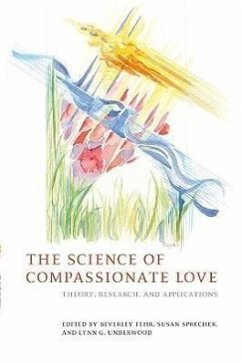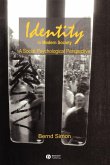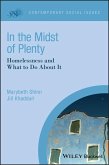What is compassionate love? How does it differ from other types of love? Can it be developed or is it innate? The term compassionate love refers to various forms of other-centered cognitions, affect, and behavior: a giving of the self for the good of the other. It is the kind of love that is central to many religious traditions: a self-giving, caring, love that values the other highly and is intended to give full life to the other. The Science of Compassionate Love answers questions about altruism and compassionate love by providing innovative, state-of-the-art research from leadingscholars. Integrating a variety of perspectives, this volume provides insight intothe nature of compassionate love and how we might better understand it, and encourage its appropriate expression in our lives. Many disciplines, with unique foci and methods, contribute to our understanding of compassionate love. By drawing from various scholars in psychology, sociology, communication, family studies, and medicine, this volume presents and integrates knowledge in a way that is informative for teaching and helpful for research. It also lays out a variety of methods and measures that pave the way forfuture directions in this field.
"Through this volume, Fehr, Sprecher, and Underwood haveprovided a detailed compilation of related theory, research, andapplications while also encouraging a reexamination of commonconceptions of compassionate love and related constructs."(PsycCritiques, June 2009)
"The contributors work in a variety ofdisciplines--social psychology, communication, health science.Together they present a state-of-the-art perspective, orientedtoward future scientific investigations of compassionate love butin touch with its roots in developments such as humanisticpsychology." (CHOICE, March 2009)"By bringing cutting-edge science to bear on the ways in whichcompassionate love is manifest in human activity, these scientistsprovide an encouraging and sensible antidote to the cynical view ofhuman nature that is so common today. Readers will find this volumea rich source of ideas for research and applications."
-Harry T. Reis, University of Rochester
"What the world needs now is not just love but compassionatelove defined as 'giving of self for the good of the other' whethersomeone close, unknown others or humanity in general. This volumebrings together distinguished researchers from a number of socialscience disciplines to focus on this important aspect of love. Thebook clearly fulfills its goal of providing a 'state of the art'treatment of this important topic. Hopefully it will also encouragefuture research that will increase our understanding of how todevelop compassionate love in our troubled world."
-Patricia Noller, University of Queensland
"The contributors work in a variety ofdisciplines--social psychology, communication, health science.Together they present a state-of-the-art perspective, orientedtoward future scientific investigations of compassionate love butin touch with its roots in developments such as humanisticpsychology." (CHOICE, March 2009)"By bringing cutting-edge science to bear on the ways in whichcompassionate love is manifest in human activity, these scientistsprovide an encouraging and sensible antidote to the cynical view ofhuman nature that is so common today. Readers will find this volumea rich source of ideas for research and applications."
-Harry T. Reis, University of Rochester
"What the world needs now is not just love but compassionatelove defined as 'giving of self for the good of the other' whethersomeone close, unknown others or humanity in general. This volumebrings together distinguished researchers from a number of socialscience disciplines to focus on this important aspect of love. Thebook clearly fulfills its goal of providing a 'state of the art'treatment of this important topic. Hopefully it will also encouragefuture research that will increase our understanding of how todevelop compassionate love in our troubled world."
-Patricia Noller, University of Queensland








